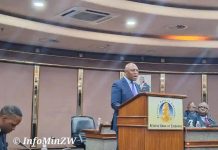Foreign currency allotments leapt almost 50 percent in yesterday’s auction to more than US$31,6 million, smashing spectacularly a record set just a week ago, and with around two thirds of those allotments going on raw materials, machinery and equipment.
It is clear the productive sectors are rapidly climbing out of the lockdown-induced economic standstill.
Even with bids and allotments topping US$30 million, and all valid bids were accepted, the Zimbabwe dollar still managed to firm a tiny quarter percent, with the exchange rate moving down from $80,71:US$1 last week to $81,4965:US$1 yesterday, the fourth small consecutive firming of the local currency.
Both the Government and Reserve Bank of Zimbabwe (RBZ) have been stressing recently that foreign currency inflows are adequate to sustain the auctions, with Finance and Economic Development Minister Professor Mthuli Ncube noting that export earnings had unexpectedly risen 30 percent.
The last three weeks have seen valid bids and allotments hitting new records each week with just over US$19 million allotted two weeks ago, more than US$21 million last week and now the giant leap to more than US$32 million.
Yet the supplies of US dollars released by the Reserve Bank into the auctions has matched the rise in bids, and that has given the bidders enough confidence to adjust bids slightly to allow the two percent firming of the local currency in the last five auctions.
RBZ is still keeping control on what bidders can spend their currency on. All bids have to be for goods and services on the import priority list, with 70 percent of bids for the main auction and 80 percent in the SMEs auction being for category 1 items, what Zimbabwe must have, and the balance for category 2, what Zimbabwe can usefully use.
While 266 bids were accepted on the main auction and 95 on the SMEs auction, the Reserve Bank was listing bids for non-priority goods and services as the main reason to reject 35 main bids and 22 SMEs bids, although failures to sort out documentation for previous exports and imports took their now small toll.
Importers of luxury items and some consumer goods still have to use free funds to pay their bills, but RBZ Governor Dr John Mangudya has noted that more than 87 percent of imports are now paid out of auction funds.
In the 14 auctions since the system started on June 23 more than US$240 million has been allotted with a quarter of that total in the last three weeks.
The foreign currency auction system has worked to entrench price stability in the market with a growing list of items, although still a short list, falling in price.
“Retailers and wholesalers have responded quite positively to the forex auction system as confirmed by the stability being enjoyed on pricing across key basic commodities,” said Confederation of Zimbabwe Retailers (CZR) president Mr Denford Mutashu.






